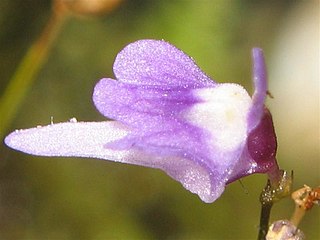Helenoconcha minutissima is an extinct species of gastropod in the family Charopidae. It was endemic to Saint Helena.
Hemistomia minutissima is a species of minute freshwater snail with an operculum, an aquatic gastropod mollusc or micromollusc in the family Tateidae. This species is endemic to Australia, where it is only known from the Erskine Valley, on the southern part of Lord Howe Island.

Utricularia minutissima is a small or very small terrestrial carnivorous plant that belongs to the genus Utricularia. U. minutissima is native to Asia and Australia. Among the islands of Southeast Asia, it is found on Borneo, New Guinea, and Sumatra.
Micronecta minutissima is a species of pygmy water boatmen in the family Micronectidae.

Carinapex is a genus of sea snails, marine gastropod mollusks in the family Horaiclavidae.
Barbeyella minutissima is a slime mould species of the order Echinosteliales, and the only species of the genus Barbeyella. First described in 1914 from the Jura mountains, its habitat is restricted to montane spruce and spruce-fir forests of the Northern Hemisphere, where it has been recorded from Asia, Europe, and North America. It typically colonises slimy, algae-covered logs that have lost their bark and have been partially to completely covered by liverworts. The sporangia are roughly spherical, up to 0.2 mm in diameter, and supported by a thin stalk up to 0.7 mm tall. After the spores have developed, the walls of the sporangia split open into lobes. The species is one of the smallest members of the Myxogastria and is considered rare.

Cocculinella minutissima is a species of small, deep water sea snail, a marine gastropod mollusk in the family Cocculinellidae, the limpets.
Spiralisigna minutissima is a moth in the family Geometridae first described by Charles Swinhoe in 1902. It is found on Sumbawa, Bali, Peninsular Malaysia, Borneo and the Philippines.
Tinagma minutissima is a moth in the family Douglasiidae. It is found in Turkey, Ukraine and Russia (Volgograd).

Pterolophia is a genus of longhorn beetles of the subfamily Lamiinae, containing the following species:

Pterolophia melanura is a species of beetle in the family Cerambycidae. It was described by Francis Polkinghorne Pascoe in 1857. It has a wide distribution in Asia.
Pterolophia undulata is a species of beetle in the family Cerambycidae. It was described by Francis Polkinghorne Pascoe in 1862. It is known from Moluccas.
Pterolophia gibbosipennis is a species of beetle in the family Cerambycidae. It was described by Maurice Pic in 1926.
Pterolophia instabilis is a species of beetle in the family Cerambycidae. It was described by Per Olof Christopher Aurivillius in 1922. It is known from Seychelles.
Pterolophia angulata is a species of beetle in the family Cerambycidae. It was described by Hermann Julius Kolbe in 1893. It has a wide distribution in Africa. It feeds on Lagerstroemia indica.
Pterolophia guineensis is a species of beetle in the family Cerambycidae. It was described by James Thomson in 1864, originally under the genus Alyattes.

The Nocoleche Nature Reserve is a conservation area in New South Wales on the Paroo River located 20 kilometres south of the town of Wanaaring, New South Wales. It was created in 1979, and has an area of 711.08 km².
Mioquerquedula is an extinct genus of ducks from the Middle Miocene containing two species, M. minutissima and M. velox. It was one of the smallest anseriforms known. The genus was erected by Nikita Zelenkov and Evgenii Nikolaievich Kurochkin in 2012.




